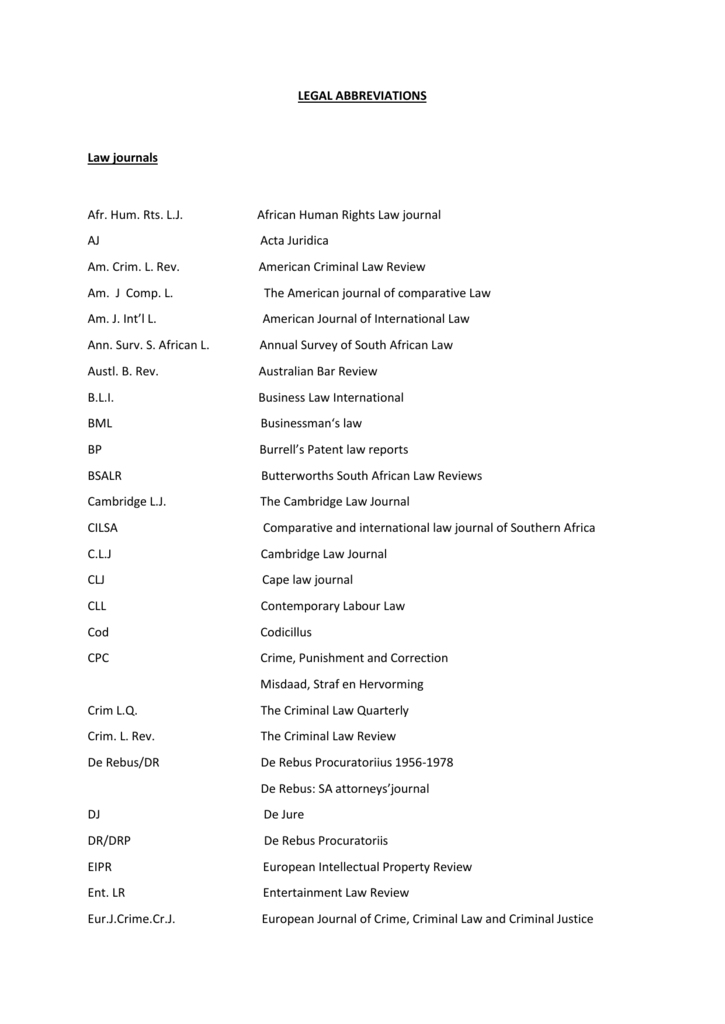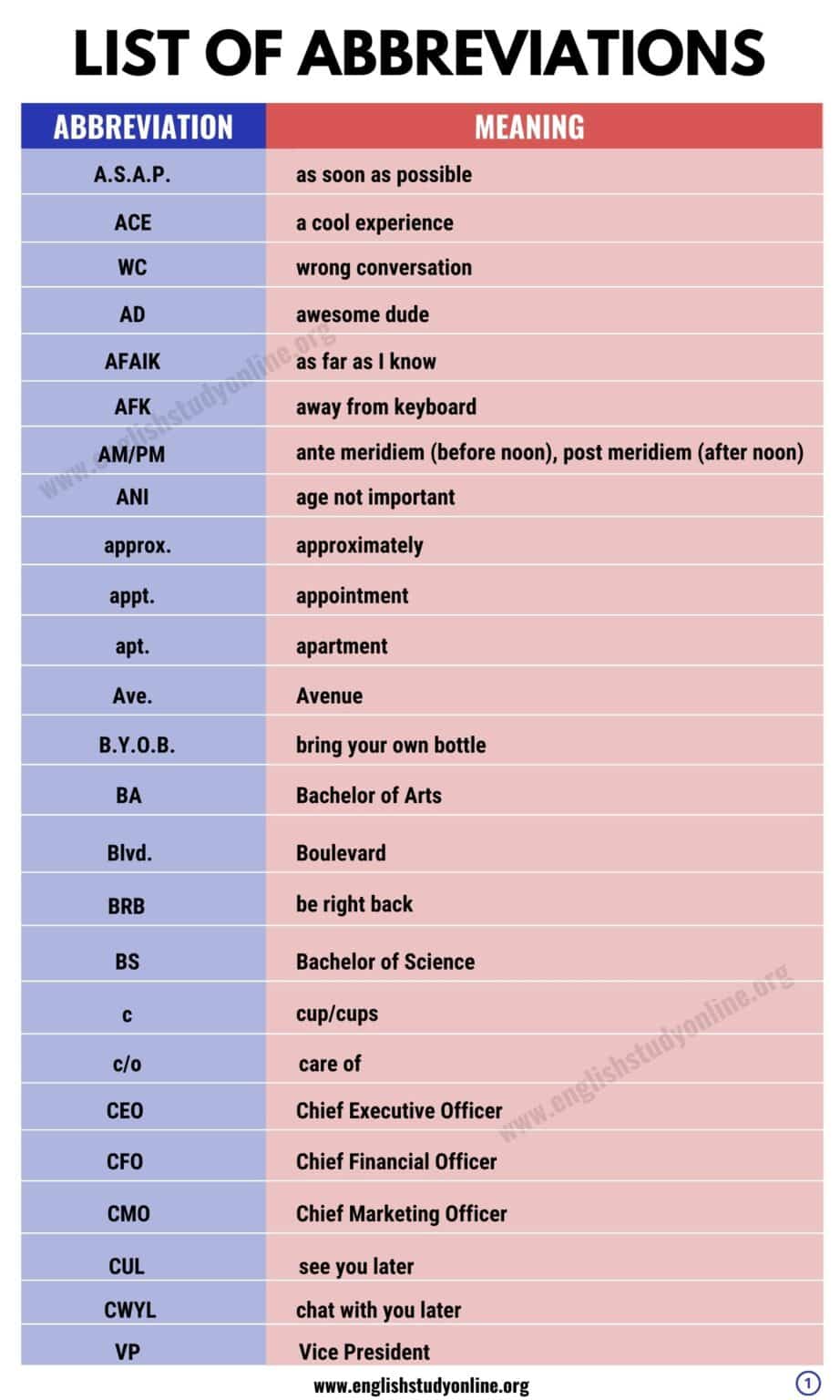Are you baffled by the alphabet soup that follows a lawyer's name? Navigating the legal landscape often feels like deciphering a secret code, and understanding those seemingly cryptic abbreviations is the first step towards clarity.
From the courtroom to the boardroom, the language of law is a unique dialect, rich with its own lexicon and shorthand. Understanding the meaning of these abbreviations is not merely an exercise in semantics, but a crucial tool for anyone engaging with legal professionals or documents. This article serves as a guide to some of the most common and essential abbreviations you'll encounter, demystifying the world of "atty.", "Esq.", and the myriad other letter combinations that define the legal profession.
| Category | Details |
|---|---|
| Name | [Insert Attorney's Full Name Here] |
| Education | Juris Doctor (J.D.) from [Law School Name], Bachelor of Arts (B.A.) from [University Name] |
| Bar Admissions | [State(s) of Admission] |
| Areas of Practice | [List of legal specializations, e.g., Criminal Defense, Corporate Law, Family Law] |
| Professional Affiliations | [Memberships in professional organizations, e.g., American Bar Association] |
| Years of Experience | [Number] years |
| Law Firm | [Law Firm Name, if applicable] |
| Contact Information | [Law Firm Address, Phone Number, Email, if available] |
| Website (Reference) | [Link Text] |
The terms "attorney" and "lawyer" are often used interchangeably, both representing a legal professional licensed to practice law. However, their origins offer a glimpse into the evolution of the English language. "Attorney" hails from French roots, derived from the word "atourner," meaning "to turn." This signifies the attorney's role of turning to legal matters for their clients. "Lawyer" on the other hand, traces its roots to Old English. The co-existence of these terms, each with its unique etymological journey, highlights the rich complexity of the English language.
- Notorious Big The Untold Story Legacy Biggie
- Bare Teeth Meaning Examples Unleashing The Hidden Meaning
When it comes to abbreviation, the most common shorthand for "attorney" is "atty." You'll find this abbreviation in a wide array of legal contexts, from case files and intra-office memos to formal correspondence. It's a practical and widely accepted way to save space and time when referring to members of the legal profession.
Furthermore, the abbreviation "Esq." (for Esquire) is frequently placed after an attorney's name. Esquire, in its traditional usage, serves as a title of respect, especially when addressing someone in their professional capacity. You might see "John Smith, Esq." on an envelope or in a letter, signifying that the individual is being addressed in their role as a legal representative.
The path to becoming an attorney is not always a straight line, but it always includes a rigorous education and licensing process. Aspiring lawyers typically earn a Juris Doctor (J.D.) degree from an accredited law school. This is a three-year, post-graduate degree, usually undertaken after the completion of a Bachelor's degree. The J.D. signifies that the individual has completed the necessary legal education. Following graduation, aspiring lawyers must pass a state bar examination. The specific requirements for the bar exam vary from state to state, but the goal is consistent: to assess a candidate's understanding of the law and their readiness to practice.
- Bryan Adams Love Life Music Everything You Need To Know
- Regina King Biography Family Career Explore The Actress Now
Once the bar exam has been successfully passed, the attorney is granted a license to practice law in that state. This is a significant achievement, as it is the license that provides the authority to represent clients and engage in legal practice. It's this licensing that entitles the individual to the "Esq." designation.
Within the legal sphere, a whole universe of acronyms and abbreviations exists beyond the simple "atty." and "Esq." Legal writing and citation systems, such as those found in the Bluebook, employ many shortcuts. These abbreviations are used in legal documents, court filings, law reports, and legal journals, ensuring that information is conveyed efficiently and accurately. Understanding these various abbreviations is an integral part of legal research and practice. For instance, you may come across abbreviations for court cases, statutes, legal organizations, and many more.
For example, the abbreviations used in legal citation, such as those found in the Bluebook, can sometimes be "inscrutable," as they often use obscure shorthand. Take, for example, "54 F.R.D." This seemingly random string is a legal citation that provides vital information about the legal authority being referenced. "F.R.D." stands for "Federal Rules Decisions," which is a publication containing the rulings of federal courts. To fully understand such citations, one must be able to decode the shorthand to pinpoint the exact publication, court, and case being referenced. Deciphering these codes is essential for effective legal research.
One of the key steps in navigating these abbreviations is to understand their purpose and context. Are they referring to a specific court, a legal publication, or a particular statute? Are these used for general citations, or specialized for very narrow areas of legal study? Different fields of law can have unique abbreviations, so understanding the area of practice is crucial.
The use of legal abbreviations also serves to facilitate efficient communication within the legal community. In note-taking during legal proceedings, the use of shorthand saves valuable time. Furthermore, in correspondence between law firms, the use of abbreviated terms helps to streamline the process and ensure concise communication.
The legal world is vast and complicated, and the language used within it reflects this complexity. Understanding legal abbreviations is a significant component of getting involved with legal processes, from a simple case to the most complicated legal disputes. Its about comprehension, effectiveness, and precision.
Learning to use the different abbreviations, such as "atty.," is key to any interaction with the legal system. While the meaning of these abbreviations might seem small at first, their role in communications between professionals is vital. It can be helpful to think of these as an important first step toward greater understanding.
In terms of the various abbreviations used, "atty." is the most common, but other abbreviations are also used. While there are different ways to abbreviate the word "attorney," the most commonly used abbreviation is, indeed, "atty."
Additionally, it's important to know when and where to use these abbreviations. In most professional settings, "Attorney" and "Esq." are preferred in formal writing. It is the most accepted form of representing someone who is licensed to practice law. For example, when writing a letter, it would be appropriate to address it to John Smith, Esq. This shows proper etiquette and provides clarity on the reader's function.
When you're looking for legal counsel, you'll often encounter various titles and designations after a name, like "J.D." or "Esq." While they both pertain to legal professionals, their meanings aren't identical. In common usage in the U.S., "Esq." conveys the ability to practice law, whereas "J.D." signifies the academic degree, but not necessarily the ability to practice law.
Understanding the precise meanings and appropriate usage of legal abbreviations can make navigating the legal system much easier. From casual conversations to the most formal legal documents, the correct use of these abbreviations is important.
From legal research to court filings, the use of abbreviations creates a language that is unique to legal practice. By understanding the common short forms, the meaning of legal jargon becomes much clearer, allowing for improved comprehension of the law.
Mastering these short forms and their contexts is a valuable skill for anyone working in, or simply encountering, the legal world. It is important for communication, research, and a stronger grasp of legal language and its applications.
The Drake University Law Library and other resources provide comprehensive guides to legal abbreviations, including lists of reporters and their corresponding abbreviations, courts, and their corresponding abbreviations. This resource can be used for legal research and offers a quick reference when working with legal jargon.
Legal research frequently includes digging into the many tables at the end of the Bluebook, which includes lists of specific abbreviations. These tables will aid in tracking down and understanding a variety of legal citations. Familiarity with these lists will greatly enhance your legal research capabilities.
By being familiar with legal language, anyone involved in legal proceedings can navigate the legal process with more confidence. Whether its understanding the difference between "attorney" and "lawyer" or learning the meaning of "Esq.", these details are invaluable for anyone needing to navigate the legal system.
In conclusion, the world of legal abbreviations is complex but navigable. By understanding the basics, from the origins of the terms to the common short forms and where to use them, anyone can greatly improve their knowledge and use of legal jargon. The journey of understanding the language of law is well worth it, allowing anyone to step into the legal world with confidence.



Detail Author:
- Name : Clifton Schaefer I
- Username : tjohnston
- Email : zhamill@crona.com
- Birthdate : 1983-08-05
- Address : 85267 Schinner Orchard Suite 956 Port Vincent, IL 15061-2827
- Phone : 323-496-8334
- Company : Greenholt Inc
- Job : Medical Sales Representative
- Bio : Perspiciatis cum nihil cum non quis minima. Libero placeat fugiat quia iure harum ex quod. Dolor alias aperiam earum vel aliquam quam corporis fugiat. Rerum corrupti aut ut recusandae qui ea.
Socials
facebook:
- url : https://facebook.com/riley.oberbrunner
- username : riley.oberbrunner
- bio : Aut magni id dolorum consequatur quaerat dolores. Quidem doloribus quis ea et.
- followers : 5122
- following : 1080
twitter:
- url : https://twitter.com/oberbrunnerr
- username : oberbrunnerr
- bio : Ipsum eveniet sint id et sit at sunt. Vel debitis quia veritatis non aut et. Sapiente minus veniam optio pariatur.
- followers : 4985
- following : 750
instagram:
- url : https://instagram.com/rileyoberbrunner
- username : rileyoberbrunner
- bio : Explicabo eos eum natus esse. Rerum aut quam sunt placeat et.
- followers : 3344
- following : 836